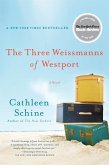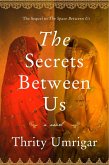A delightfully clever contemporary novel inspired by the Louisa May Alcott classic
In Katharine Weber's third novel, The Little Women, three adolescent sisters--Meg, Jo and Amy--are shocked when they discover their mother's affair, but are truly devastated by their father's apparently easy forgiveness of her. Shattered by their parents' failure to live up to the moral standards and values of the family, the two younger sisters leave New York (and their private school) and move to Meg's apartment in New Haven, where Meg is a junior at Yale. They enroll in the local inner-city public high school, and, divorced from their parents, they try to make a life with Meg as their surrogate mother.
Written in the form of an autobiographical novel by Joanna, the middle sister, the pages of The Little Women are punctuated by comments from the "real" Meg and Amy. Their notes and Jo's replies form a second narrative, as they argue about the "truth" of the novel.
Why do readers insist on searching for the autobiographical elements of fiction? When does a novelist go too far in mulching actual experience for a novel? What rights, if any, does a writer have to grant the people in her life and story?
An ingenious combination of classic storytelling in a contemporary mode, The Little Women confirms Katharine Weber's reputation as a writer who "astutely explores the gap between perception and reality." (The New York Times Book Review)
In Katharine Weber's third novel, The Little Women, three adolescent sisters--Meg, Jo and Amy--are shocked when they discover their mother's affair, but are truly devastated by their father's apparently easy forgiveness of her. Shattered by their parents' failure to live up to the moral standards and values of the family, the two younger sisters leave New York (and their private school) and move to Meg's apartment in New Haven, where Meg is a junior at Yale. They enroll in the local inner-city public high school, and, divorced from their parents, they try to make a life with Meg as their surrogate mother.
Written in the form of an autobiographical novel by Joanna, the middle sister, the pages of The Little Women are punctuated by comments from the "real" Meg and Amy. Their notes and Jo's replies form a second narrative, as they argue about the "truth" of the novel.
Why do readers insist on searching for the autobiographical elements of fiction? When does a novelist go too far in mulching actual experience for a novel? What rights, if any, does a writer have to grant the people in her life and story?
An ingenious combination of classic storytelling in a contemporary mode, The Little Women confirms Katharine Weber's reputation as a writer who "astutely explores the gap between perception and reality." (The New York Times Book Review)
Dieser Download kann aus rechtlichen Gründen nur mit Rechnungsadresse in D ausgeliefert werden.









